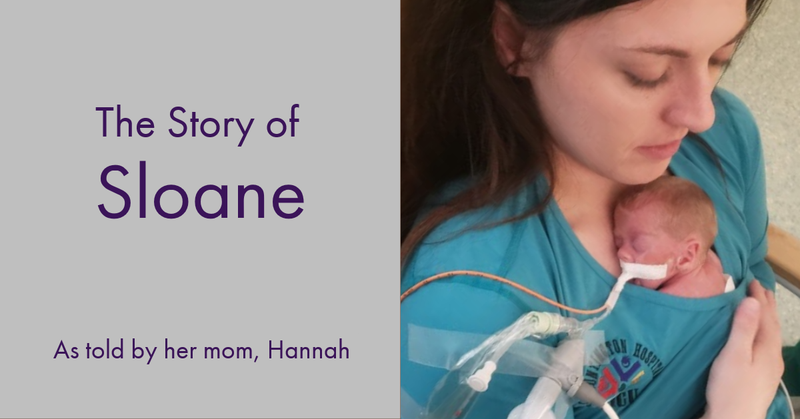Parent Stories
The story of Sloane, as told by her mom, Hannah

On a Thursday night in April, after coming home from work, I started having intense contractions. Given that this was my first pregnancy, I didn’t know if this was normal. I called the OB emergency hotline just to be safe, and they suggested I come in first thing in the morning. I scheduled my appointment, laughing at how overly cautious I was being and anticipating I’d be sent home feeling silly. But that wasn’t the case. It was discovered that I had preterm rupture of membranes and a shortened cervix. I was in preterm labor at just 24 weeks and a few days pregnant. Giving birth was imminent, and I was admitted into the hospital until I delivered. To say I was shocked, devastated, and confused was an understatement.
The following day, my condition was changed to “stable.” However, I could still have quickly gone from 0 to fully dilated in a matter of minutes, and whether this would happen in days or weeks was up to Mother Nature to decide. That afternoon I woke up from a nap and felt the worse pressure imaginable, and I knew the time had come to deliver. In a moment when I should’ve been scared, I felt calm and focused. I wanted to make this delivery as easy as possible for my daughter.
In the NICU
On April 11, at just 25 weeks and 1 day’s gestation, our “micro-preemie” baby, Sloane Naomi, was born. She weighed 1 pound 9 ounces and was not even a foot in length. What should have been a glorious, celebratory moment was instead a moment filled with terror and isolation as the medical team attempted to keep my new baby alive in the next room. Even today, just remembering that night makes me sick to my stomach.
Sloane spent 116 days in the neonatal intensive care unit (NICU). We had the typical ups and downs in the NICU. Sloane’s most significant problems were respiratory. She was on a ventilator for about a month and had a hard time coming off CPAP. She was eventually transitioned onto a nasal cannula and luckily didn’t need it at discharge. She was also averse to taking food by mouth, which I learned is common for babies on long stints of respiratory support.
During the first few days of her life, one of the nurses caring for Sloane told me that the best thing I could do for her while she was in the NICU was pump. She educated me on how breast milk was more natural for her immature stomach to tolerate and how it provided her immune system with antibodies. I was determined to do everything possible to give her my milk, and luckily the hospital was fully supportive! They kept a breast pump in her room so that I could pump while visiting her.
Advocating for NICU Nutrition
When Sloane’s medical team began mentioning the need for a fortifier, I requested Prolacta’s fortifier. The neonatologist responded that they didn’t carry it. But I pushed them to get it for Sloane, feeling confident that giving her Prolacta’s fortifier and cream would give her the best chance of succeeding in the NICU. With my medical background as a pharmacist, I knew she would eventually need a fortifier to help her grow. I’d researched the best types of fortifiers for premature babies and had come across several studies indicating that premature babies who are given mom’s milk along with a fortifier made from 100% human milk have the best possible chance of being protected from necrotizing enterocolitis and maintaining good growth. Prolacta offered the only fortifier made from 100% human milk for babies born weighing less than 1250 grams.
I’m happy to say that Sloane was the first Prolacta baby at her hospital. The nurses and neonatologists were impressed by how well she was developing, and at 116 days, my baby girl was discharged weighing 5 pounds 12 ounces and measuring 18 inches long!
After the NICU
Today, Sloane is 4 months old (1 month adjusted)! She can lift her head, grip things, return our smiles, and move her head toward our familiar voices.
Advice to NICU Parents
I have three pieces of advice. First, be as educated as possible about your situation, and this will give you the confidence needed to be the best advocate for your baby. Even with my medical background, I didn’t understand everything that was being done to my baby. When this happened, I reached out to the doctor or nurses to educate me. By gaining a better understanding, I felt more in control. Second, I had a few individual nurses that I trusted 100% and would request to have one of those nurses care for Sloane (be aware that some hospitals may not allow this). Lastly, make sure to lean on your support system, which for me was our families, our church friends, and our CrossFit buddies. I don’t know what I would’ve done without those groups of people.
